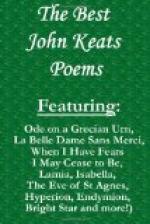|
This section contains 10,756 words (approx. 36 pages at 300 words per page) |

|
SOURCE: Brinks, Ellen. “The Male Romantic Poet as Gothic Subject: Keats's Hyperion and The Fall of Hyperion: A Dream.” Nineteenth-Century Literature 54, no. 4 (March 2000): 427-54.
In the following essay, Brinks considers the construction of masculinity and homoeroticism as part of a Gothic subtext in Hyperion and The Fall of Hyperion.
With Hyperion: A Fragment and The Fall of Hyperion: A Dream, John Keats's efforts to write an epic in 1818 and 1819 failed. Yet the irony of this “failure” has not gone unnoticed: not only is it the grounds for the placement of these works at an interpretive center of the Keatsian canon, but poetic failure can also be said to elevate their status to works that define a specifically Romantic ideology. Many recent analyses of Hyperion and The Fall of Hyperion focus on the productive contradictions between the two poems' formal fragmentation and Keats's allegory of poetic election. Marjorie Levinson...
|
This section contains 10,756 words (approx. 36 pages at 300 words per page) |

|


